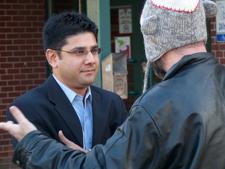A bill to give the province the power to evict sex workers and drug users from their homes passed second reading Oct 31. Critics say it lowers the burden of proof for eviction, circumvents criminal law and could leave landlords on the hook for tenants’ bad behaviour.
The sweeping bill allows people to make anonymous complaints about their neighbours to a quasi-judicial body, who has the power to forbid people from returning to their houses.
Ottawa’s Yasir Naqvi introduced the private member’s statute, Bill 106.
“Law-abiding citizens who are working really hard, we want to make sure they’re living in a safe neighbourhood,” says Naqvi.
Naqvi says he received a lot of complaints from neighbours of drug users. When nothing is done, neighbours must deal with the fallout, and that’s unfair, says Naqvi.
“What we’re doing is rehabilitating the property,” says Naqvi.
During the 2007 provincial election, Naqvi campaigned on a pledge that Ontario adopt Safer Communities and Neighbourhoods (SCAN) legislation similar to laws in Manitoba and British Columbia. Although he’s a member of the Dalton McGuinty Liberals, he appears to have been unable to shore up cabinet support for the proposal.
After the election, Naqvi was appointed parliamentary secretary to the minister of Community Safety and Correctional Services. Before Bill 106 was tabled, he was shuffled to the Department of Revenue.
SCAN’s target is crack houses. Its wording captures apartments used for grow ops, dealing drugs, sex work and also recreational drug users.
The bill creates a quasi-judicial complaints board that has the power to investigate activity and oust offending tenants or punish landlords.
MPP Cheri DiNovo denounced the bill on behalf of the NDP, saying that it is contrary to the philosophy that housing is a human right.
If a tenant’s conduct is illegal, they should be arrested, not evicted, she says.
“We don’t have to go into draconian legislation like Bill 106,” said DiNovo at the bill’s second reading. “It flies in the face of due process. It may even fly in the face of the Canadian Charter of Rights and Freedoms.”
Since the Ontario Liberals took power in 2003, Queen’s Park has passed an average of seven private member’s bills a year. In 2007, no private member’s bills became law.
The NDP are not the only ones who are upset. The Advocacy Centre for Tenants-Ontario officially opposes Naqvi’s private member’s bill.
After the bill passed second reading, Naqvi held an Oct 31 press conference at the Hintonburg Community Centre. There, members of Prostitutes of Ottawa-Gatineau, Work, Educate, Resist (POWER) protested against the legislation.
POWER issued a statement before Naqvi’s press conference with the slogan “nothing about us, without us.”
They oppose SCAN legislation, instead proposing “affordable housing, real treatment options, freedom from police harassment and an end to poverty and homelessness in Ontario.”
John Hollingsworth, a volunteer with Housing Help, was also on hand to voice his opinion.
“It gives additional powers to the police,” Hollingsworth says. “And it lowers the basic standard of proof.”
With crime rates declining, both politicians and police are trying to find new ways of proving to their constituents that they are tough on crime, he says.
At the press conference, Naqvi shared the stage with Vern White, chief of Ottawa police, and Nancy Warsfold, director of Crime Prevention Ottawa. Eight uniformed police officers flanked the speakers, and behind them about a dozen protesters held signs that said “Sex work is work” and “Canada’s sex laws are indecent.”
Warsfold complains that the “civil remedies” available to the neighbours of crack dealers and users take more than a year to get resolved. Crime Prevention Ottawa wants to see the SCAN Act implemented.
“We looked for a solution that was both humane and efficient,” says Warsfold. “Here in Ottawa we’d be using it to address the disorder caused by drug use.”
As for the bill, it heads to committee and must receive a third yea from Queen’s Park before it becomes law.
Naqvi says he’s eager to meet with people to hear their concerns and try to convince them of SCAN’s merits. He also says there’s room to tweak its provisions.
“We can make some changes in the committee system to make it better,” he says.


 Why you can trust Xtra
Why you can trust Xtra


